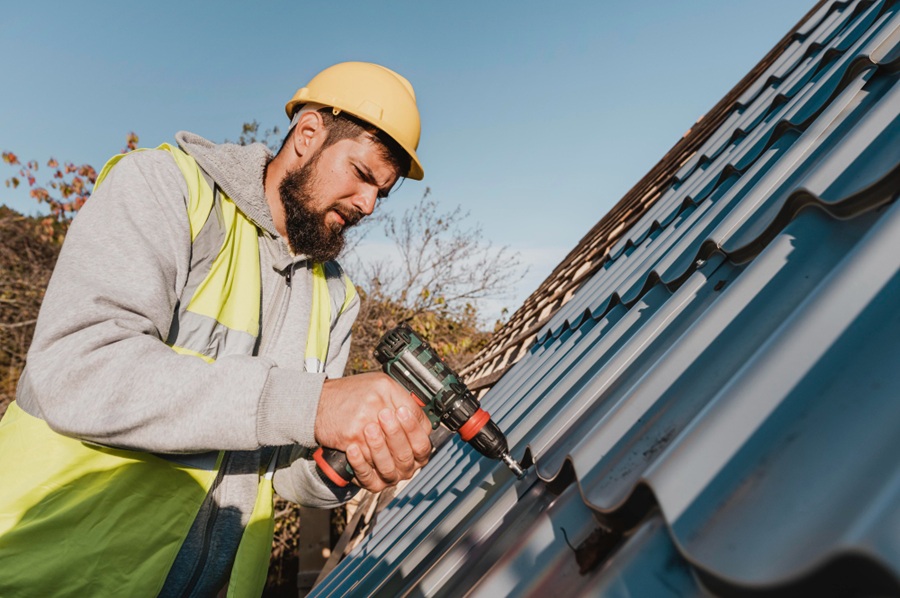Maintaining the integrity of your home starts at the top—literally. Your roof is your primary defense against the elements, and keeping it in optimal condition is crucial. But what do you do when signs of wear and tear appear? Should you opt for a full roof replacement or a simple roof repair? This decision can significantly impact your home’s safety, value, and energy efficiency. Let’s delve into the factors that should influence your decision, ensuring you make the best choice for your home’s needs.
Signs That Your Roof Needs Attention
A worn-out roof is more than just an eyesore; it can lead to severe issues if not addressed. Here’s how to assess whether your roof is pleading for help:
Age of the Roof
| Roofing Material | Typical Lifespan (Years) |
| Asphalt Shingles | 20-25 |
| Metal | 40-70 |
| Tile | 50+ |
- Asphalt Shingles: Typically last between 20-25 years.
- Metal Roofs: Known for longevity, metal roofs span 40-70 years.
- Tile Roofs: Offer durability of over 50 years.
Understanding how old your roof is can guide your decision between repair and replacement. An aging roof may no longer provide the protection your home needs.
Visible Damage
Common visible signs include:
- Missing or Cracked Shingles: Can expose your home to the elements.
- Sagging: Indicates structural issues and may necessitate an immediate roof replacement.
- Algae Growth: While mostly cosmetic, it can indicate trapped moisture.
Leaks and Water Damage
If you notice:
- Water stains on your ceiling.
- Spots on your walls. Leaks are not just a nuisance; they can lead to significant structural damage. Ignoring them could mean a bigger disaster down the line.
Energy Efficiency Decline
Signs that your roof is affecting your energy bills:
- Drafts: Indicate poor insulation.
- Inconsistent indoor temperatures: Suggest your roof isn’t working efficiently.
Reasons to Repair Your Roof
A roof repair is often a quick fix that can solve immediate problems without breaking the bank. Here are scenarios where it makes sense to go this route:
Localized Damage
Repairs are ideal when:
- Damage is confined to just a few shingles or a small area.
- There are no underlying structural issues.
Sound Structural Integrity
If the roof’s overall structure is still robust, opt for repairs to extend its life. Consistent maintenance can push the lifespan further without requiring a full roof replacement.
Budget Constraints
Repairing is a cost-effective short-term solution when you’re:
- Stuck with financial limitations.
- Not ready for the investment required for a complete roof installation.
Consider: Temporary fixes while budgeting for a full overhaul.
Reasons to Replace Your Roof
Sometimes a roof repair won’t suffice, and replacement is the best option:
Extensive Damage
A widespread issue often warrants a new roof:
- Issues such as widespread mold or severe storm damage can’t be easily patched up.
Frequent Need for Repairs
If you’re constantly calling a roofing contractor for fixes, it might be time to consider the long-term saving benefits of an entire roof installation:
Increased Home Value
A new roof can:
- Boost your home’s curb appeal.
- Increase its market value making replacement a strategic investment, especially if planning to sell.
Energy Efficiency Benefits
Modern roofing technology offers:
- Better insulation.
- Lower energy bills. A new roof can improve indoor comfort levels and reduce your carbon footprint.
Factors to Consider When Deciding
Making a decision involves more than just looking at the current state of your roof. Evaluate these aspects:
Cost Analysis
Comparing repair and replacement costs:
| Consideration | Roof Repair | Roof Replacement |
| Immediate Costs | Lower | Higher |
| Long-term Value | Low-Moderate | High |
| Impact on Home Value | Minimal | Significant |
Include potential savings from improved energy efficiency when determining your total cost.
Timing and Planning
- Best Time for Repairs: Spring and summer, when weather is more predictable.
- Best Time for Replacement: Consider your climate; avoid extreme weather conditions.
Planning affects costs and ensures availability of seasoned roofing contractors and materials.
Professional Assessment
- Getting a professional evaluation provides a clear report on your roof’s condition. Roofing contractors offer insights into whether a repair will suffice or if a full replacement is necessary. Expert advice is invaluable for making an informed decision.
Conclusion
Whether you choose roof repair or a full roof replacement, maintaining the roof’s condition ensures the overall safety and efficiency of your home. Weigh your options based on personal circumstances, expert guidance, and the long-term benefits. Don’t wait for minor issues to worsen; address them proactively.








Leave a Reply